
Playlists
 |
Playlist Playlists |
| Iconiche scene di ballo da film non
musicali - Seconda parte Iconic dance scenes from non-musical movies - Part 2 |
|
| Nota: E' disponibile una
versione
pdf di questo Dossier. |
Note: A
pdf version
of this Dossier is available. |
|
|
|
| Riprendendo i personaggi di una serie televisiva degli anni '60, il regista giapponese Kitano mette in scena le imprese di uno spadaccino cieco e invincibile, realizzando una specie di beffardo omaggio al cinema dei "Sette samurai". Muovendosi liberamente tra i generi, questo misto di azione, ironia e valori solidali termina con una celebre e coinvolgente scena di ballo collettivo, che mescola tip-tap e sonorità orientali. |
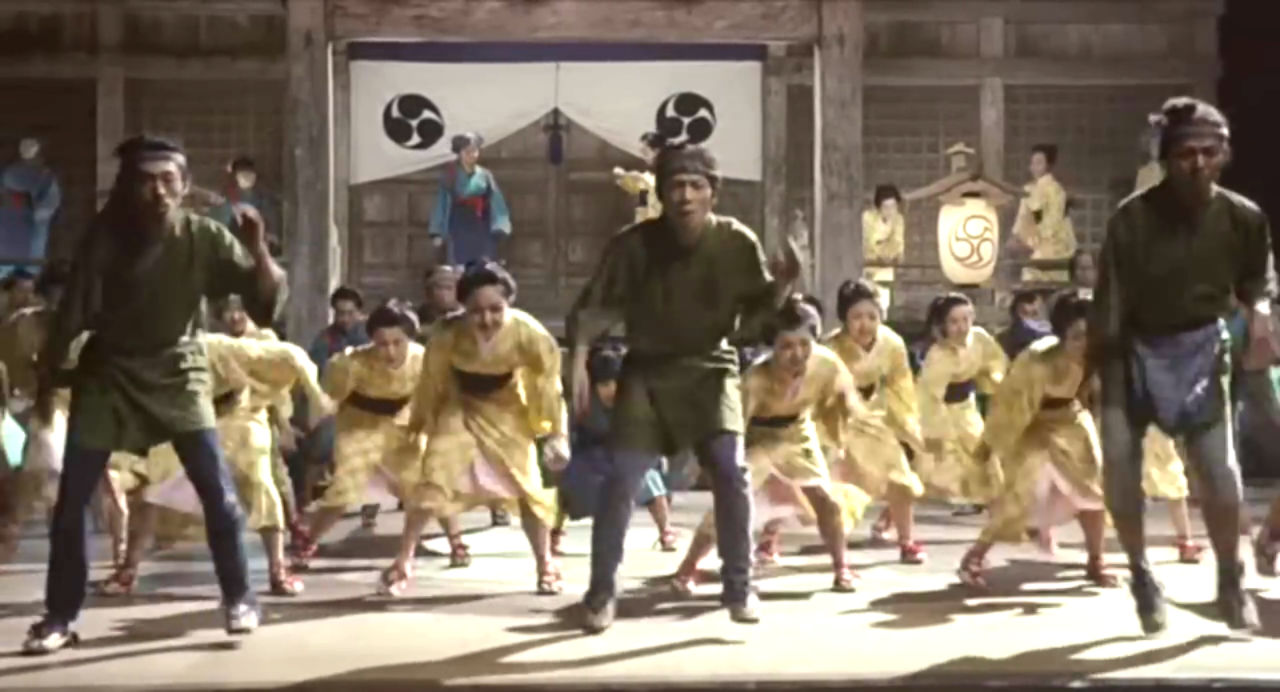 Zatoichi (di/by Takeshi Kitano, Giappone/Japan 2003) |
Taking up the characters of a '60s television series, Japanese director Kitano stages the exploits of a blind and invincible swordsman, creating a sort of mocking homage to the cinema of "Seven Samurai". Moving freely between genres, this mix of action, irony and solidarity values ends with a famous and engaging collective dance scene, which mixes tap dancing and oriental sounds. |
| I "500 giorni" sono il periodo in cui si sviluppa la storia d'amore, contrastata e segnata da continui alti e bassi, tra Tom e la sua ragazza (Sole, in originale Summer, da cui il titolo americano). Una storia altamente prevedibile, ma punteggiata da momenti di coinvolgimento sentimentale e di spensieratezza, soprattutto in questo finale, in cui Tom, finalmente sicuro dell'amore di Sole, si lancia in una passeggiata di danza in cui tutti quelli che incontra gli sorridono e il mondo sembra rinato apposta per lui ... |
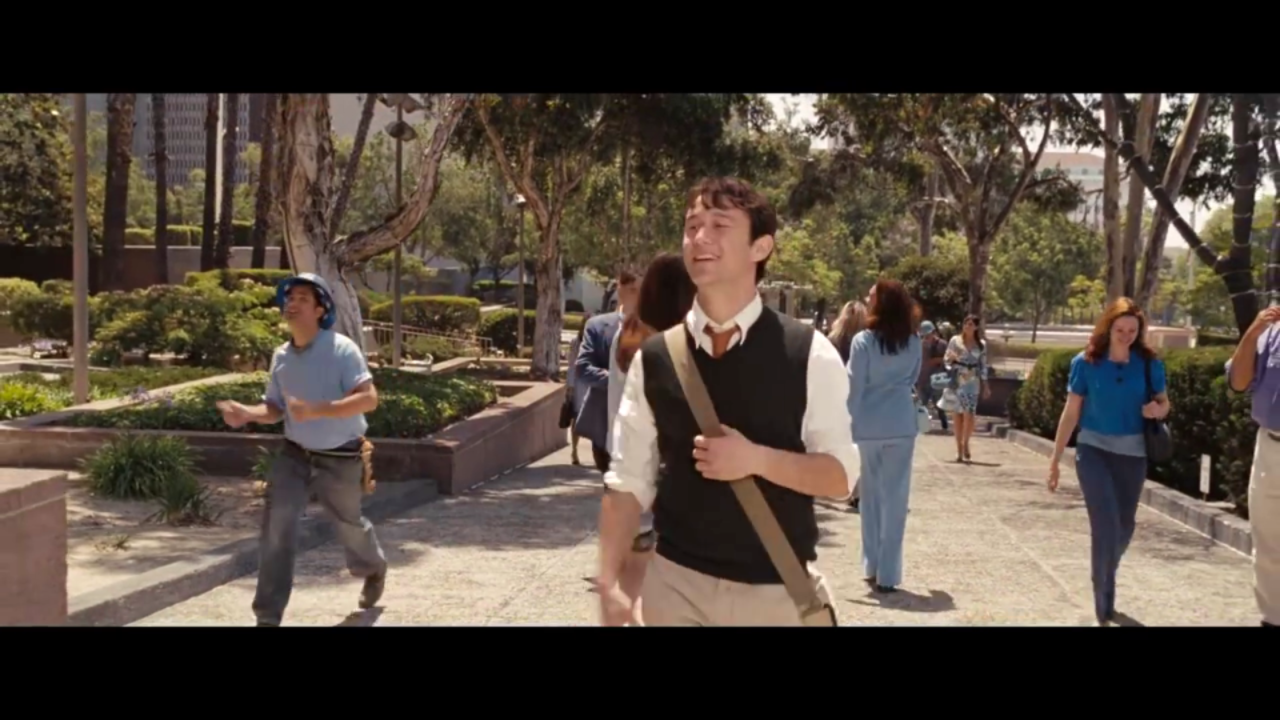 (500) Giorni insieme/(500) Days of summer (di/by Marc Webb, USA 2009) |
"500 days" is the period in which we witness the love story, thwarted and marked by continuous ups and downs, between Tom and his girlfriend (Summer, hence the American title). A highly predictable story, but punctuated by moments of sentimental involvement and lightheartedness, especially in this finale, in which Tom, finally sure of Summer's love, launches into a dance walk in which everyone he meets smiles at him and the world seems reborn especially for him ... |
| Un programmatore informatico, Caleb, scopre che il suo capo, Nathan, uomo scostante e con senso di onnipotenza, ha costruito un umanoide femminile, Ava, dotato di Intelligenza Artificiale. Tra Caleb e Ava nasce una complicità, e, dopo che Nathan ha eseguito una danza con Ava, alla presenza di Caleb, quest'ultimo deciderà di aiutarla sfuggire dalle sgrinfie di Nathan. In questo ballo, su toni latino-americani, Nathan sembra dimostrare, più che le sue doti di ballerino, la sua innata sete di potere, quasi un nuovo Frankenstein che dona la vita agli automi. |
 Ex machina (di/by Alex Garland, GB 2015) |
A computer programmer, Caleb, discovers that his boss, Nathan, an unsympathetic man with a sense of omnipotence, has built a female humanoid, Ava, equipped with Artificial Intelligence. A complicity is born between Caleb and Ava, and, after Nathan performs a dance with Ava, in Caleb's presence, the latter decides to help her escape from Nathan's clutches. In this dance, with Latin-American tones, Nathan seems to demonstrate, more than his dancing skills, his innate thirst for power, almost a new Frankenstein who gives life to automatons. |
| Il film è la storia di Olive, una ragazzina grassottella che vuole a tutti i costi partecipare ad un concorso di bellezza. Ha alle spalle una famiglia disfunzionale, che trova però il coraggio di partire su uno sgangherato pulmino per la California: padre, madre, nonno, un fratello e persino uno zio gay la aiuteranno a raggiungere l'obiettivo. E in questa danza finale, sulle note di "Super Freak" di Rick James, Olive ha modo di mostrare tutta la sua grinta, in una performance quasi da striptease orchestrata proprio dal nonno. Ma il ballo diventa subito un'espressione sfrenata di assoluta libertà, con cui la piccola Olive mette in scena la liberazione sua, e di tutta la sua famiglia, dalle paure, le ansie e le debolezze che hanno sempre attanagliato questo strampalato gruppo di persone. |
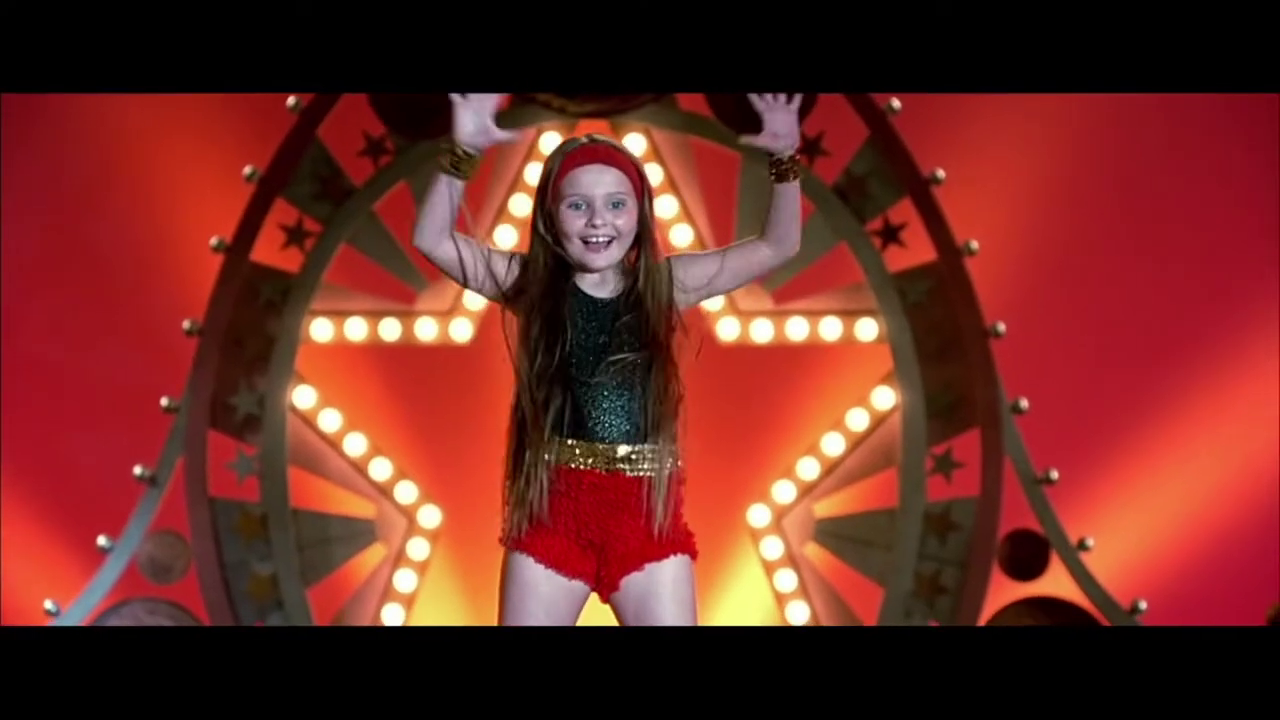 Little Miss Sunshine (di/by Jonathan Dayton e/and Valerie Faris, USA 2006) |
The film is the story of Olive, a plump girl who wants to participate in a beauty contest at all costs. She comes from a dysfunctional family, who however finds the courage to leave in a rickety van for California: her father, mother, grandfather, a brother and even a gay uncle will help her reach her goal. And in this final dance, to the tune of "Super Freak" by Rick James, Olive has the opportunity to show all her talent, in an almost striptease-like performance orchestrated by her grandfather. But the dance immediately becomes an unbridled expression of absolute freedom, with which little Olive stages her liberation, and that of her entire family, from the fears, anxieties and weaknesses that have always gripped this bizarre group of people. |
| Ancora un successo per la DreamWorks, che rinverdisce la favola di Shrek con queto secondo capitolo della piccola saga. I genitori di Fiona non sono affatto contenti che la figlia abba sposato Shrek, il che ha provocato la sua trasformazione in orchessa. Ma l'amore come sempre trionfa, sia pure in mezzo a difficoltà di ogni tipo e con la partecipazione di vari personaggi fiabeschi, da Gatto con gli Stivali a Pinocchio. E ancora una volta una scena di ballo è d'obbligo ... |
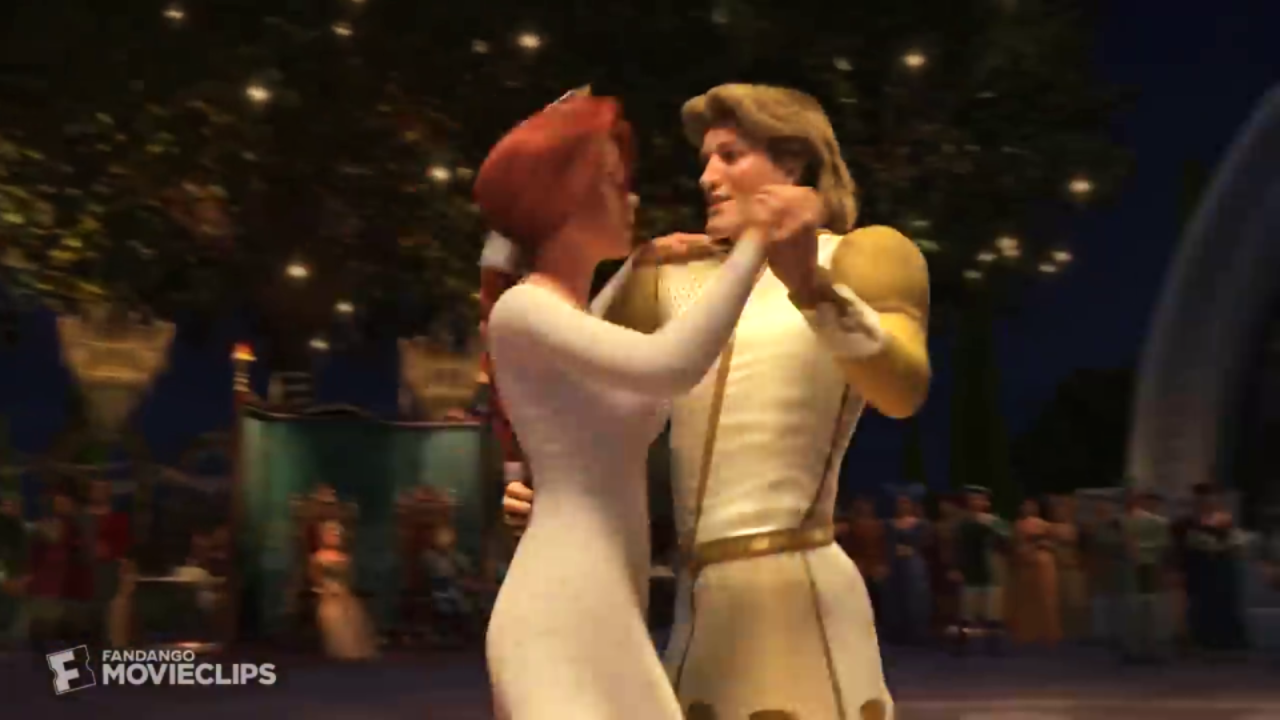 Shrek 2 (di/by Andrew Adamson, Kelly Asbury e/and Conrad Vernon, USA 2004) |
Another success for DreamWorks, which revives the Shrek tale with this second chapter of the saga. Fiona's parents are not at all happy that their daughter has married Shrek, which caused her transformation into an ogress. But, as always, love triumphs even in the midst of difficulties of all kinds and with the participation of various fairy-tale characters, from Puss in Boots to Pinocchio. And once again a dance scene is a must ... |
| Forse il miglior film di John Hughes, che l'anno precedente aveva diretto l'"instant cult" Breakfast Club (anch'esso incluso nella nostra playlist, vedi oltre), mette ancora in scena un adolescente che marina la scuola per godersi una giornata all'insegna della follia a bordo della Ferrari del padre ... finendo in mezzo alla parata in onore dei concittadini tedeschi. E proprio questa parata per le vie di Chicago diventa un'irrefrenabile inno alla gioia dell'essere giovani, e nel contempo quasi un omaggio al musical classico hollywoodiano. |
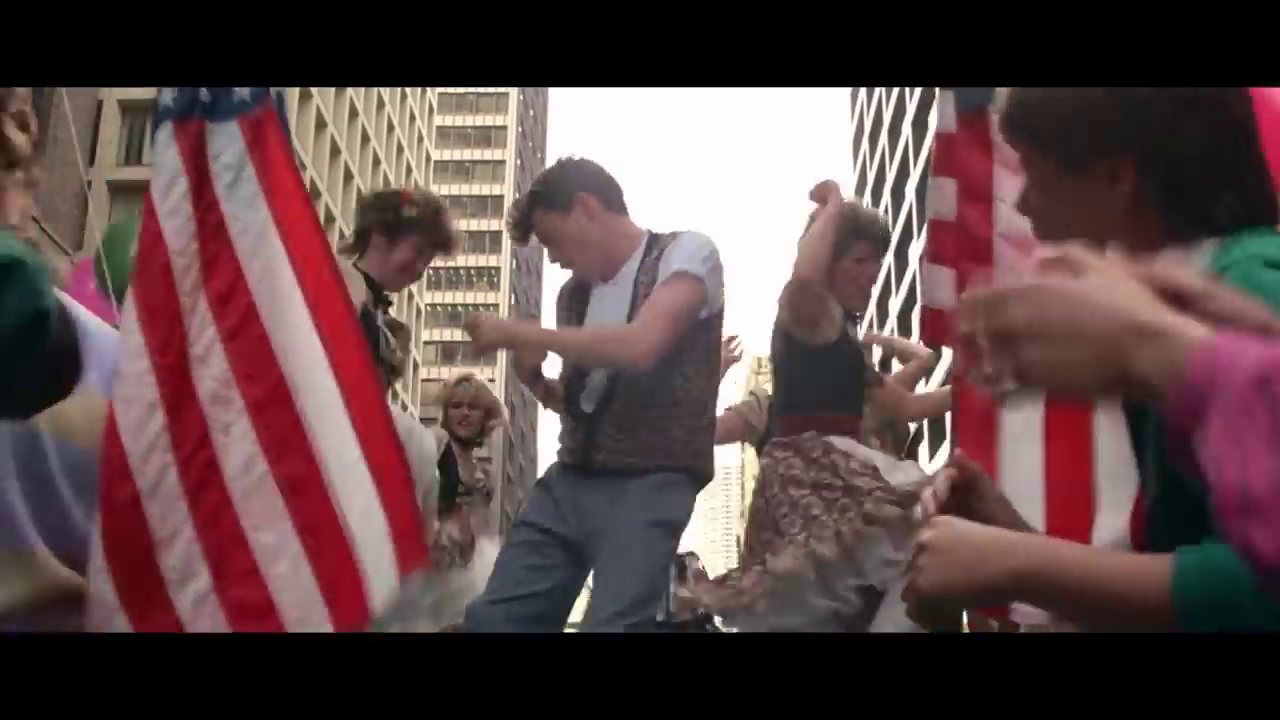 Una pazza giornata di vacanza/Ferris Bueller's Day Off (di/by John Hughes, USA 1986) |
Perhaps the best film by John Hughes, who the previous year had directed the "instant cult" Breakfast Club (also included in our playlist, see below), this film focusses, once again, on a teenager who skips school to enjoy a day of madness aboard his father's Ferrari ... ending up in the middle of the parade in honor of his fellow German citizens. And it is precisely this parade through the streets of Chicago that becomes an irrepressible hymn to the joy of being young, and at the same time almost an homage to the classic Hollywood musical. |
| E' quasi un altro omaggio ai balletti classici di Busby Berkeley degli anni '30 questa sequenza da Il grande Lebowski in cui l'ex-hippy Lebowski (Jeff Bridges), assunto da un miliardario suo omonimo perchè si incarichi del riscatto relativo al rapimento della moglie, scoprirà che in realtà non c'è stato nessun rapimento ... Il film è anche una satira del film noir, orchestrata con la consueta maestria dai fratelli Coen, con un tono tra il cinico e il malinconico ma anche con un senso morale della decadenza di un'intera società. |
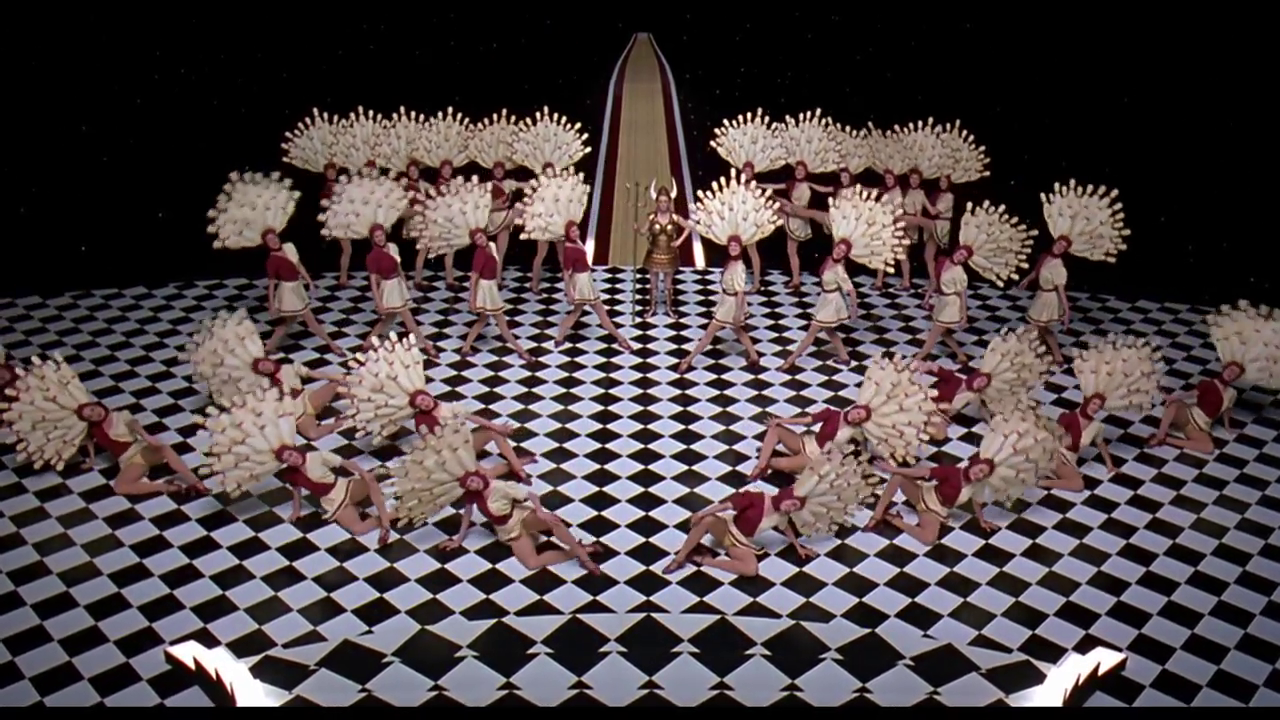 Il grande Lebowski/The Big Lebowski (di/by Joel e/and Ethan Coen, USA/GB 1998) |
Almost another homage to the classic Busby Berkeley ballets of the '30s is this sequence from The Big Lebowski, in which the ex-hippie Lebowski (Jeff Bridges), hired by a billionaire of the same name to take care of the ransom for the kidnapping of his wife, discovers that in reality there was no kidnapping... The film is also a satire of film noir, orchestrated with the usual mastery by the Coen brothers, with a tone that is somewhere between cynical and melancholic but also with a moral sense of the decadence of an entire society. |
| Accanto a Barbie c'è naturalmente Ken (Ryan Gosling), ossia il suo compagno maschio, anch'esso bello (senza strafare), biondo e muscoloso - come da stereotipo del bambolotto. Ma Ken (anzi, tutti i Ken che abitano Barbieland, tutti forzatamente uguali) non ha una personalità propria, vive in funzione di Barbie, in una società dove le donne-bambole sono autosufficienti e i loro compagni maschi fanno semplicemente da decorazione: "Barbie passa una gran bella giornata ogni giorno, ma Ken passa una bella giornata solo se Barbie lo guarda". In questa sfrenata esibizione, i maschi di Barbieland danzano con tutta l'energia di cui sono capaci, quasi nel tentativo di recuperare un loro ruolo in un mondo post-patriarcale ... |
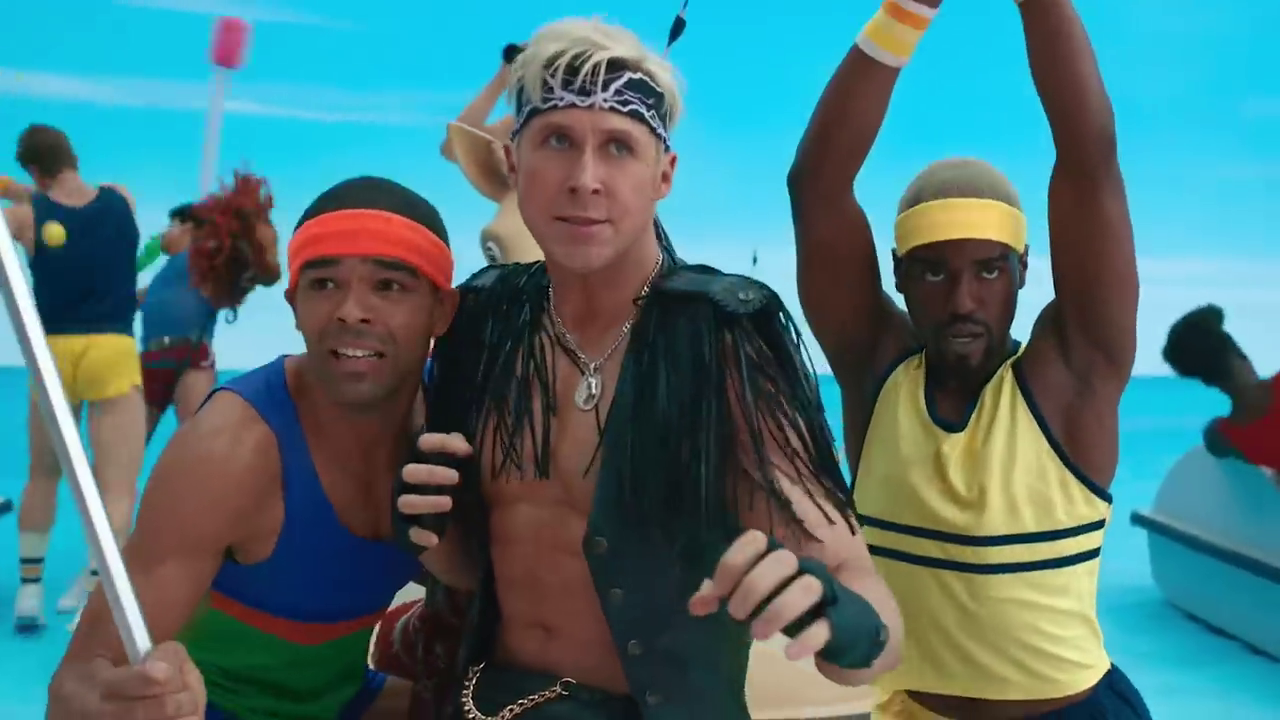 Barbie (di/by Greta Gerwig, USA/GB 2023) |
Alongside Barbie there is of course Ken (Ryan Gosling), that is, her male companion, also handsome, blond and muscular - as per the doll stereotype. But Ken (indeed, all the Kens who live in Barbieland, all forcedly the same) does not have his own personality: he lives as a function of Barbie, in a society where women-dolls are self-sufficient and their male companions are simply a decoration: "Barbie spends a great day every day, but Ken spends a beautiful day only if Barbie looks at him ". In this wild performance, the males of Barbieland dance with all the energy they can muster, almost as if they were trying to reclaim their role in a post-patriarchal world... |
| Uno studente secchione ("nerd") aiuta un compagno latino-americano a vincere le elezioni del liceo - e in questo suo sforzo troverà forse anche l'amore, ma soprattutto avrà la possibilità di uscire dalla gabbia di convenzioni in cui si trova relegato per esprimere meglio la propria personalità. Come in questo ballo da solista, in cui si offre senza vergogna ad un pubblico sorpreso dall'esibizione inaspettata di un personaggio spesso emarginato. |
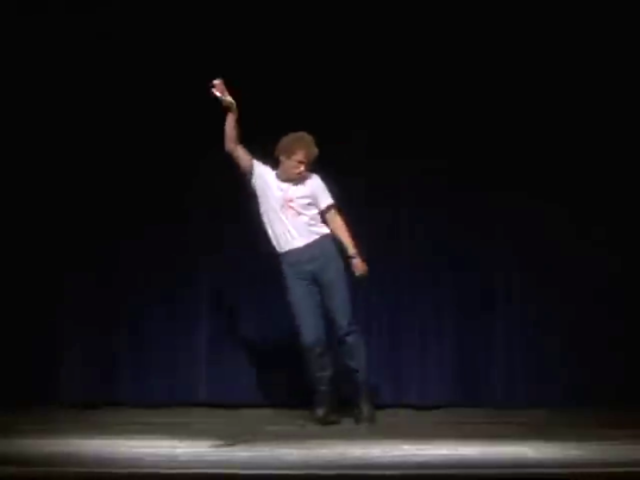 Napoleon Dynamite (di/by Jared Hess, USA 2004) |
A nerdy student helps a Latino classmate win the high school elections - and in this effort he may even find love, but above all he will have the opportunity to break out of the cage of conventions in which he is relegated to better express his personality. As in this solo dance, in which he shamelessly offers himself to an audience surprised by the unexpected performance of an often marginalized character. |
| All'interno di uno dei capitoli della saga di Harry Potter troviamo questa scena di ballo, in cui Harry ed Hermione, all'interno di una tenda, passano gli ultimi momenti prima del conflitto finale con Voldemort. I due giovani, sulle note di una delicata ballata di Nick Cave and the Seeds ("O'Children"), si lasciano andare a qualche attimo di spensieratezza e di genuina emozione, da gustare ancora di più perchè prossimi a tempi oscuri ... |
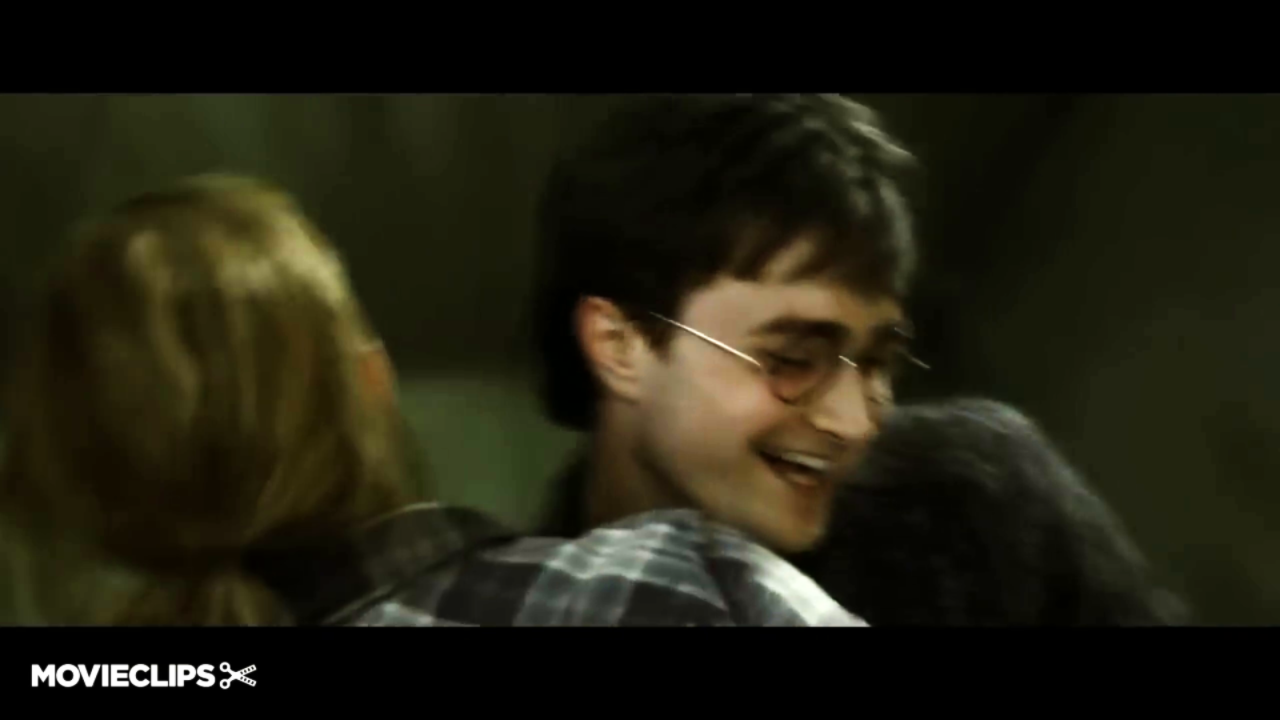 Harry Potter e i doni della morte - Parte 1/Harry Potter and the Deathly Hallows - Part 1 (di/by David Yates, GB/USA 2010) |
In one of the chapters of the Harry Potter saga we find this dance scene, in which Harry and Hermione, inside a tent, spend the last moments before the final conflict with Voldemort. The two teenagers, to the tune of a delicate ballad by Nick Cave and the Seeds ("O'Children"), indulge in a few moments of lightheartedness and genuine emotion, to be enjoyed even more because dark times are approaching ... |
| Il regista Edgar Wright omaggia in questo film tanta tradizione del "noir", aggiornandola con toni farseschi e volutamente sopra le righe. Eccezionale è l'utilizzo della colonna sonora, che accompagna ogni sequenza con un ritmo musicale assordante, virando quasi la vicenda verso il musical. In effetti il protagonista, Miles (detto "Baby") un ragazzo che soffre di acufene, ascolta in continuazione musica a tutto volume proprio per contrastare il suo disturbo. Assoldato da un geniale rapinatore come bravissimo autista per le sue imprese criminali, Miles "Baby" non può fare a meno di soccombere al richiamo della danza sulle note di brani musicali scelti con estrema cura. |
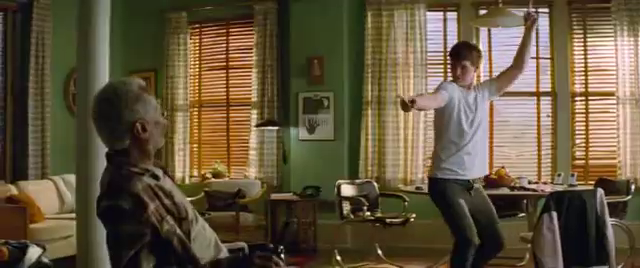 Baby driver - Il genio della fuga/Baby driver (di/by Edgar Wright, GB/USA 2017) |
Director Edgar Wright pays homage to the "noir" tradition in this film, updating it with farcical and deliberately over-the-top tones. The use of the soundtrack is exceptional, accompanying each sequence with a deafening musical rhythm, almost turning the story into a musical. The main character, Miles (called "Baby"), a boy who suffers from tinnitus, constantly listens to music at full volume precisely to counteract his disorder. Hired by a brilliant robber as a very good driver for his criminal enterprises, "Baby" Miles cannot help but succumb to the call of dancing to the tune of musical pieces chosen with extreme care. |
| Due coniugi passati a miglior vita tornano nella loro casa come fantasmi ma, disturbati dagli odiosi nuovi inquilini, assoldano lo spirito Beetlejuice per farli spaventare - ma non sarà così facile. In questa sequenza, Tim Burton realizza un ritratto anarchico e ironico di questi personaggi che, invasati dall'atmosfera soprannaturale, si lanciano in un ballo sfrenato sulle note di "Day O" (Banana Boat Song), facendo una specie di karaoke con la voce originale di Harry Belafonte. |
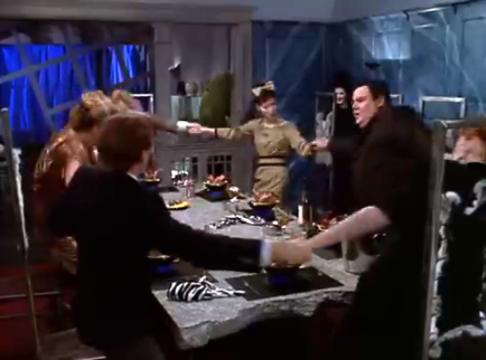 Beetlejuice - Spiritello porcello/Beetlejuice (di/by Tim Burton, USA 1988) |
A deceased couple returns to their home as ghosts but, disturbed by the hateful new tenants, they hire the spirit Beetlejuice to scare them - but it won't be that easy. In this sequence, Tim Burton creates an anarchic and ironic portrait of these characters who, possessed by the supernatural atmosphere, launch into a wild dance to the tune of "Day O" (Banana Boat Song), doing a kind of karaoke with Harry Belafonte's original voice. |
| L'incontro tra due giovani, Pat (Bradley Cooper) e Tiffany (Jennifer Lawrence), segnati entrambi da dolorose esperienze, si trasforma in un'occasione di riscatto e di recupero delle fiducia nella vita. La partecipazione ad una gara di ballo cementerà la loro unione e farà vincere a Pat una doppia scommessa: la vittoria della squadra di football degli Eagles e il voto minimo di "5" nella gara di ballo. Il titolo originale fa riferimento al "playbook", il volume che raccoglie le strategie di una squadra di football, e al detto inglese "Every cloud has a silver lining", cioè "Ogni nuvola ha un bordo d'argento", ossia "c'è sempre un lato positivo". |
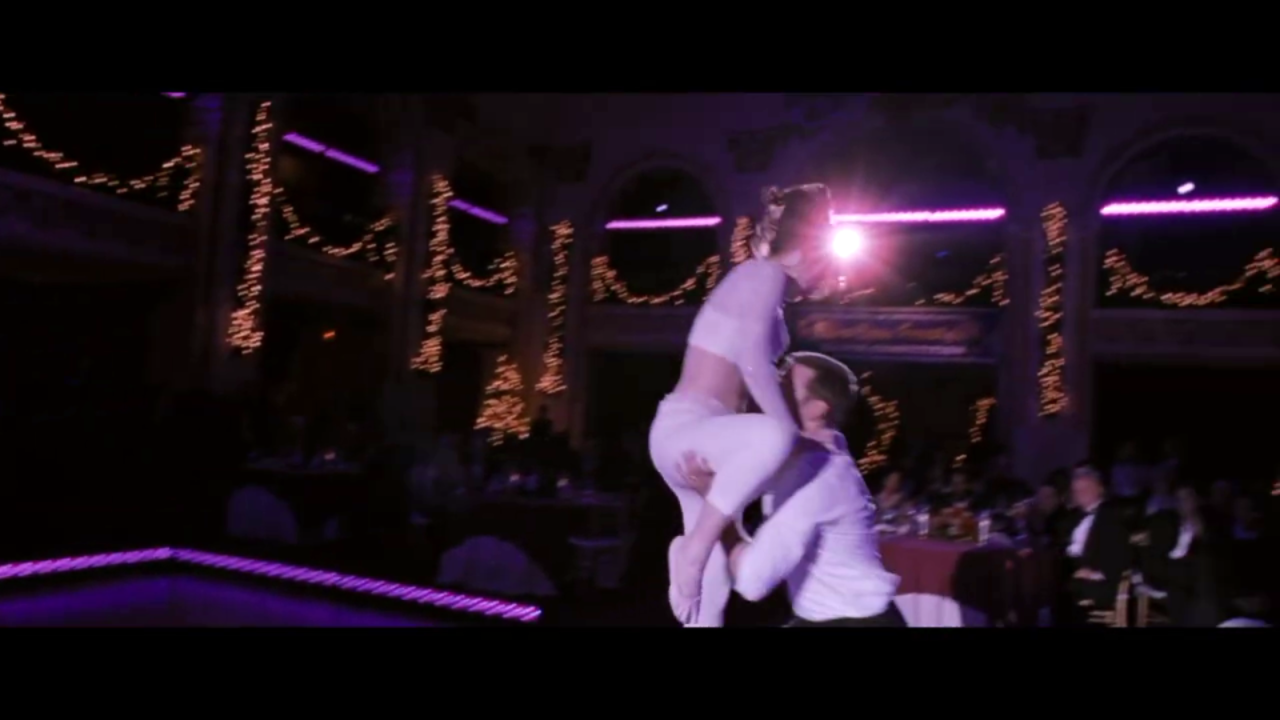 Il lato positivo - Silver Linings Playbook/Silver Linings Playbook (di/by David O. Russell, USA 2012) |
The meeting between two young people, Pat (Bradley Cooper) and Tiffany (Jennifer Lawrence), both marked by painful experiences, turns into an opportunity for redemption and recovery of faith in life. Participation in a dance competition will cement their union and will make Pat win a double bet: the victory of the Eagles football team and the minimum score of "5" in the dance competition. The original title refers to the "playbook", the volume that collects the strategies of a football team, and to the English saying "Every cloud has a silver lining", i.e. is "there is always a positive side". |
| Subito diventato un cult, Breakfast Club ha segnato l'immaginario collettivo degli anni '80 con il ritratto di cinque studenti-tipo (il secchione, l'atleta, la disadattata, il bullo, la figlia di papà) costretti per punizione a rimanere un intero sabato a scuola, sorvegliati a vista da un inetto insegnante. Dapprima diffidenti l'uno verso l'altro, impareranno nel corso della giornata ad uscire dai propri cliché e a rivelare gli aspetti più profondi della propria personalità E il ballo, che parte da uno di loro ma conquista subito gli altri, è il gesto liberatorio con cui questi ragazzi sembrano riappropriarsi di una loro vita autonoma, autentica e socializzata. |
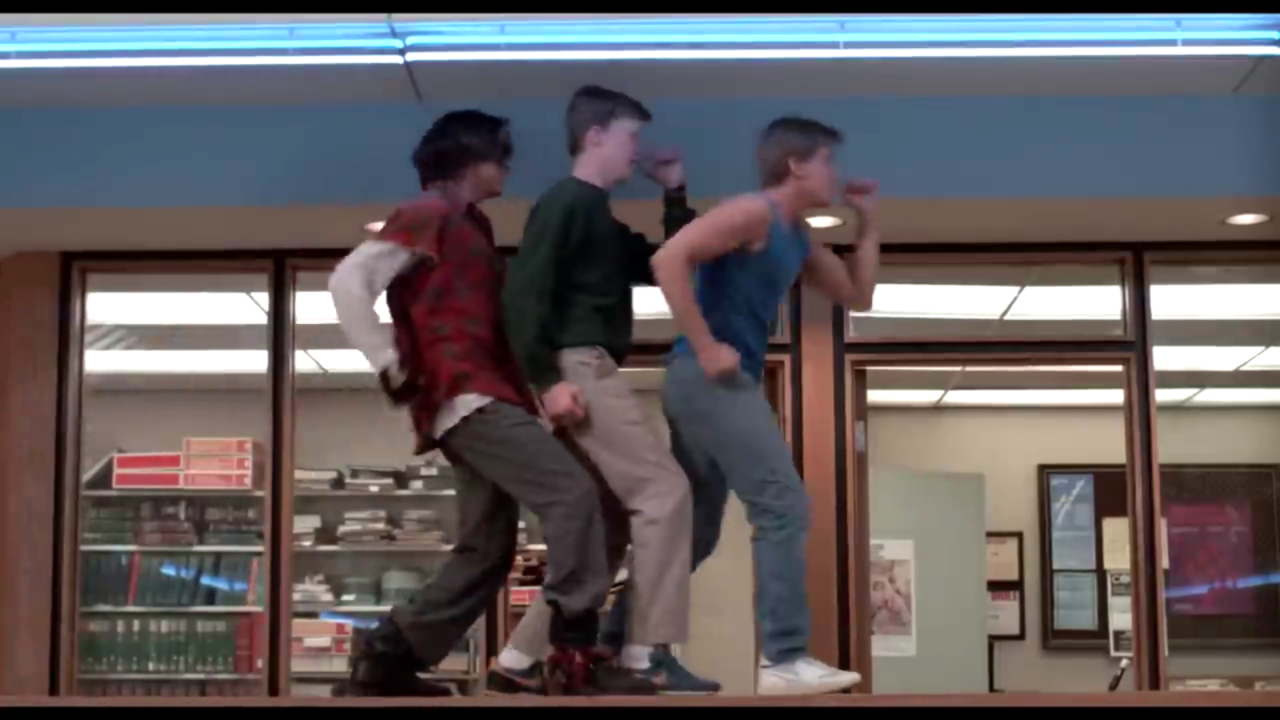 Breakfast Club/The Breakfast Club (di/by John Hughes, USA 1985) |
Instantly becoming a cult, The Breakfast Club marked the collective imagination of the '80s with the portrait of five typical students (the nerd, the athlete, the misfit, the bully, the daddy's girl) forced as punishment to stay an entire Saturday at school, watched over by an inept teacher. Initially distrustful of each other, they will learn over the course of the day to break out of their clichés and reveal the deepest aspects of their personality. And the dance, which starts with one of them but quickly conquers the others, is the liberating gesture with which these kids seem to reclaim their autonomous, authentic and socialized life. |
| Una storia di
redenzione e di liberazione, sia pure in un contesto completamente
diverso, la Germania del 1945, è quella raccontata in Jojo Rabbit.
Orfano di padre, il decenne un po' introverso Johannes, detto Jojo
"Rabbit" per non essere riuscito a catturare un coniglio durante
un'esercitazione della gioventù hitleriana, scopre che la madre nasconde
in casa un'adolescente ebrea, Elsa. Inizialmente ai ferri corti, il
rapporto tra Jojo e Elsa si trasformerà in complicità e amicizia, così
che, dichiarata finita la guerra, i due ragazzini si ritroveranno faccia
a faccia e, guardandosi negli occhi, finiranno per soccombere, sulle
note della versione tedesca di "Hero" di David Bowie, a dei passi di
danza appena accennati - ma sufficienti per far intuire che, forse, il
loro rapporto potrà avere un futuro ... E il film termina con una
toccante citazione da Rainer Maria Rilke: Lascia che tutto ti accada Bellezza e terrore Vai sempre avanti Nessun sentimento è definitivo |
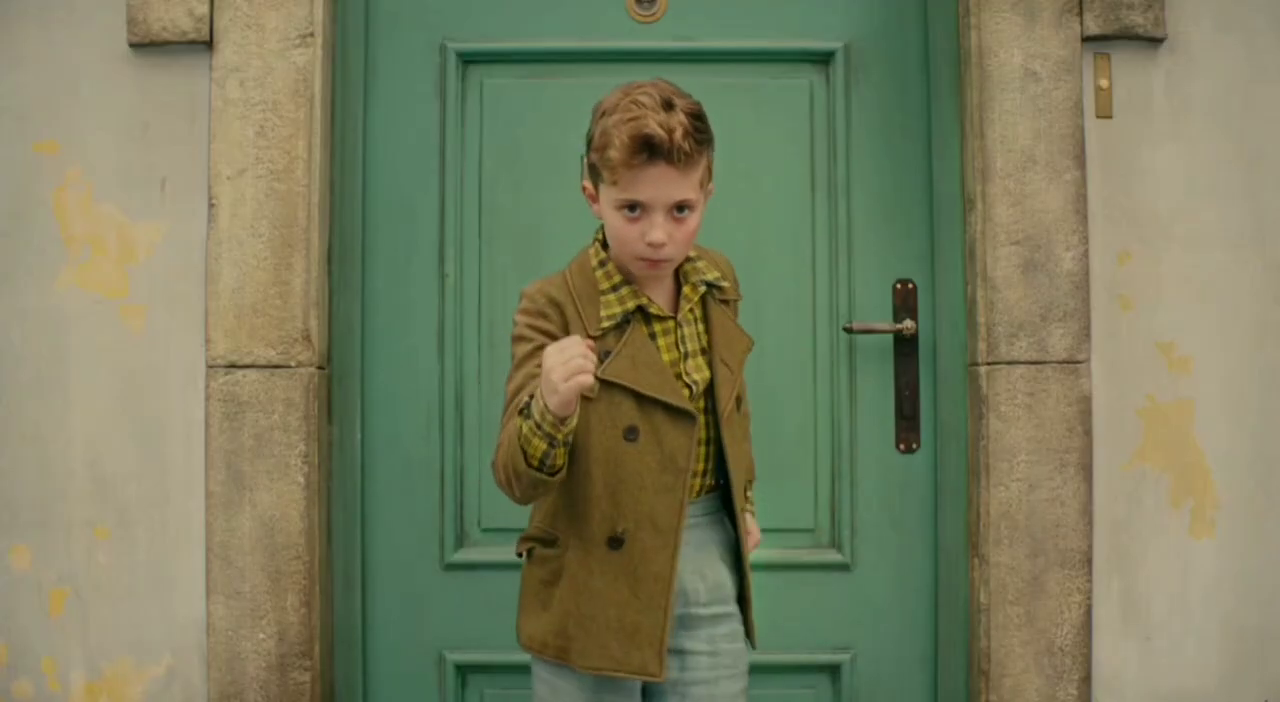 Jojo Rabbit (di/by Taika Waititi, Nuova Zelanda/New Zealand- USA- Repubblica Ceca/Czec Republic) |
A story of redemption and
liberation, albeit in a completely different context, Germany in 1945,
is the one told in Jojo Rabbit. Fatherless, the ten-year-old
and somewhat introverted Johannes, nicknamed Jojo "Rabbit" for failing
to catch a rabbit during a Hitler Youth exercise, discovers that his
mother is hiding a Jewish teenager, Elsa, in their house. Initially at
loggerheads, the relationship between Jojo and Elsa will transform into
complicity and friendship, so that, once the war is over, the two kids
will find themselves face to face and, looking into each other's eyes,
will end up succumbing, to the notes of the German version of "Hero" by
David Bowie, to some barely hinted dance steps - but enough to hint
that, perhaps, their relationship could have a future ... And the film
ends with a touching quote from Rainer Maria Rilke: Let everything happen to you Beauty and terror Just keep going No feeling is final |
| Joaquin Phoenix è al suo meglio nell'interpretazione di Arthur Fleck, un aspirante comico soffocato da traumi infantili e un disturbo psichico che gli provoca irrefrenebaili attacchi di riso. Eppure Arthur sarà in grado di dare una svolta decisiva alla sua vita trasformandosi, dopo alterne drammatiche vicende, in Joker, il villain della cittadina di Gotham. La scena-simbolo di questa trasformazione lo vede ballare in modo scatenato sulla scalinata del quartiere di Highbride, sulle note di "Rock'n roll" di Gary Glitter, una vera e propria "rinascita" dalle ceneri della sua precedente personalità. |
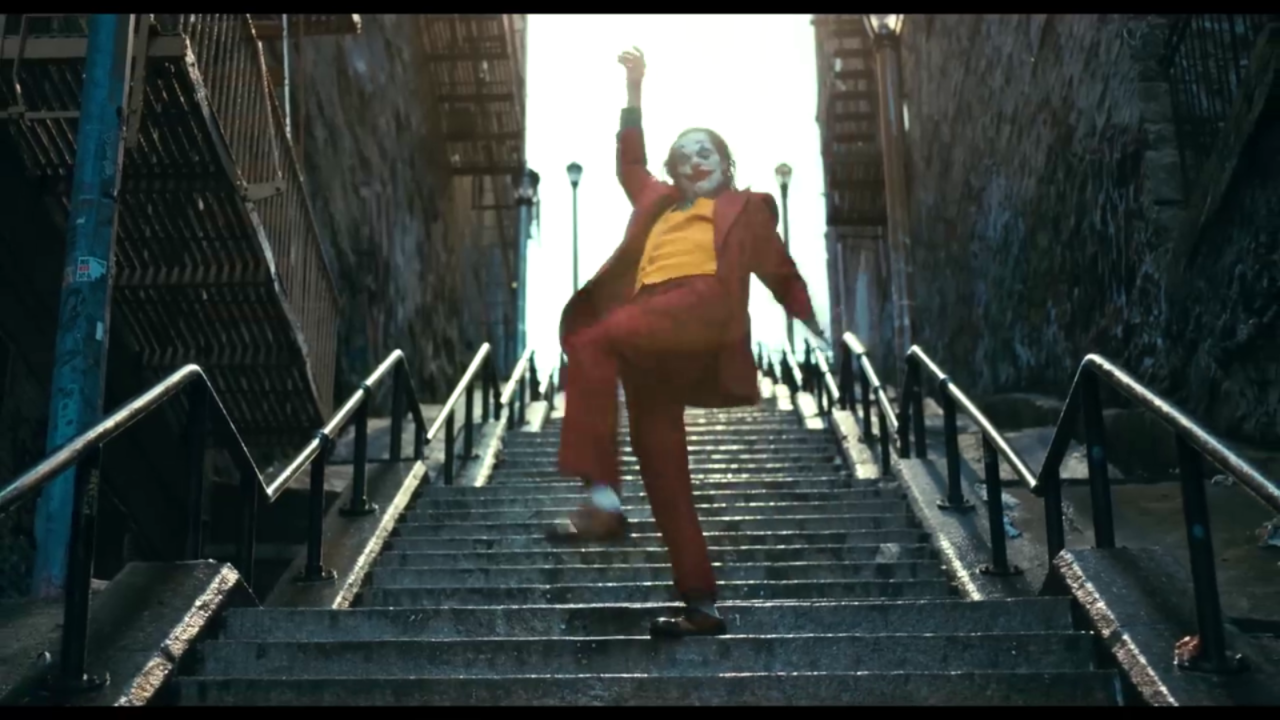 Joker (di/by Todd Phillips, USA 2019) |
Joaquin Phoenix is at his best in playing the character of Arthur Fleck, an aspiring comedian suffocated by childhood traumas and a mental disorder that causes him uncontrollable fits of laughter. Yet Arthur will be able to give a decisive turn to his life by transforming, after alternating dramatic events, into Joker, the villain of the city of Gotham. The symbolic scene of this transformation sees him dancing wildly on the steps of the Highbride neighborhood, to the tune of "Rock'n roll" by Gary Glitter, a true "rebirth" from the ashes of his previous personality. |